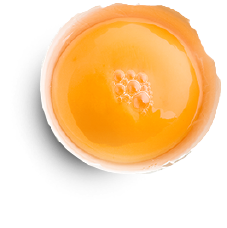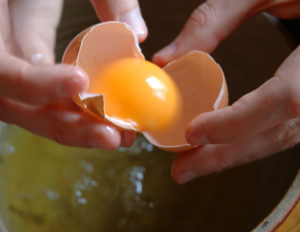Filter By

Six things to know about the inside of an egg
Variation in the color and appearance of the inside of an egg can be due to many factors:
A red spot near the yolk indicates a blood or meat spot. This is caused by the rupture of a small blood vessel around the yolk at the time of ovulation, or the presence of tissue during egg formation. These eggs are perfectly safe to eat with proper cooking.
time of ovulation, or the presence of tissue during egg formation. These eggs are perfectly safe to eat with proper cooking.
A cloudy egg white indicates the egg is exceptionally fresh. The cloudiness is due to the presence of naturally occurring levels of carbon dioxide when an egg is laid.
A white, stringy substance is called the chalazae. It anchors the yolk in place and the more prominent the chalazae, the fresher the egg. Chalazae do not interfere with the cooking or beating of the white and need not be removed.
Lighter or darker yellow yolks are influenced by pigments in feed in the hen’s diet. Hens fed wheat and barley produce eggs with lighter color yolks. Hens fed green plants, corn and alfalfa produce eggs with darker color yolks. The yolk color does not indicate hen health or egg nutrition. The yolk color also has no relationship to egg quality, flavor, cooking characteristics or shell thickness.
A green ring on a hard-cooked yolk is the result of overcooking. The green color is caused by sulfur and iron compound reactions on the yolk surface. Hard-cooked eggs can also have black or brown spots on the albumen (egg white) from overcooking or burning. Discoloration due to overcooking does not impact food safety and these eggs are safe to eat.
Spoiled Eggs
The colors below indicate “bad” eggs. If you see any of these colors, discard the egg immediately.
Eggs with off-color egg white, i.e., green, or iridescent, may be spoiled due to bacterial growth, in particular Pseudomonas spp. This is a common type of bacteria that healthy people often carry without knowing it. This bacteria produces a greenish, fluorescent coloration in the egg white.
If a raw egg does not look good, or smell good, err on the side of caution and discard. An unpleasant odor in cooked eggs, or a dish containing cooked eggs, indicates spoilage and the food should be discarded.
Raw eggs will absorb odors from items stored around them due to the natural respiration of an egg. Therefore, do not store eggs near pungent foods in the refrigerator such as onions or strong cheeses.
Never eat raw eggs and always cook eggs to the recommended temperature to ensure any harmful bacteria is destroyed.

 Back
Back